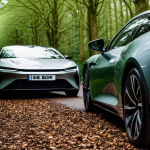Overview of Customization Trends in the UK Automotive Industry
The UK automotive market is witnessing a dynamic shift in customization trends, driven by evolving consumer preferences. Vehicle owners are increasingly seeking personalized experiences, reflecting a shift away from standardized options.
Current trends indicate a surge in demand for bespoke aesthetics, where elements such as custom paintwork and unique interiors are topping the list. This shift is largely influenced by consumers’ desire to express individuality and align vehicles with personal lifestyles.
Topic to read : What role does the UK automotive sector play in global markets?
Consumer expectations are now transforming design choices within the industry. There’s a growing emphasis on technology integration, such as advanced infotainment systems and connectivity features, reflecting a tech-savvy customer base.
Social media and digital platforms play a pivotal role in shaping these customization trends. Platforms like Instagram and Pinterest serve as inspiration hubs, where potential car buyers are exposed to innovative customization ideas. This exposure drives demand and encourages manufacturers to offer options that cater to these emerging preferences.
Additional reading : How Can Sustainability Transform the Future of the UK Automotive Industry?
Moreover, interactive configurators on brand websites enhance consumer engagement by allowing users to visualize and experiment with customization options online, bridging the gap between consumer demand and market offerings.
Overall, the UK automotive market is embracing customization as a core strategy to cater to consumer demand, ensuring that buyers feel their vehicles are a true reflection of their personality and lifestyle.
Case Studies of Brands Responding to Customization Demands
The UK automotive market is a vibrant landscape where brands are increasingly tailoring their strategies to cater to distinct consumer interests. Here are some notable examples from automotive brands that are setting trends and redefining the market through customization.
Manufacturer Case Study: Brand A
Brand A has paved the way in customization with a diverse array of options that resonate with modern consumer demand. With bespoke paint selections and tailored interiors, they demonstrate an acute awareness of the importance that customization trends hold in the industry. Consumer feedback reflects enthusiasm, translating into robust sales performance that underscores the brand’s adept response to evolving tastes. Lessons gleaned from these approaches are likely to guide Brand A’s future strategies, ensuring continued success and relevance.
Manufacturer Case Study: Brand B
Brand B stands out for its innovative and distinctive approaches to customization. By integrating cutting-edge personalization features like digital dashboards and adaptive control systems, Brand B boosts both brand loyalty and consumer satisfaction. The appealing technological advancements they provide address specific consumer needs and enhance the overall driving experience, illustrating the impact of tech-savvy designs in the market.
Manufacturer Case Study: Brand C
Responding astutely to specific consumer demands, Brand C has carved out its niche in this competitive landscape. By focusing on particular customization features high in consumer preference, they have achieved significant market share growth. The brand’s strategies are not only successful in meeting current consumer expectations but also strategically positioned against competitors, effectively leveraging their unique offerings to gain a competitive edge in the customization space.
Technological Advancements Enabling Customization
Within the UK automotive market, rapid customization innovations are transforming how vehicles are personalized. The integration of cutting-edge automotive technology like 3D printing is a game-changer, offering precision and versatility in creating bespoke components. This technology allows manufacturers to produce complex designs without traditional tooling, thus fuelling creativity in customization.
Incorporating AI and machine learning is another avenue elevating the customization process. These technologies empower manufacturers to predict and analyze consumer preferences, enabling them to offer personalized recommendations. For instance, AI systems analyze consumer data to suggest tailored design choices, reflecting individual tastes more accurately.
Digital tools have become invaluable, enhancing how consumers interact with customization options online. Interactive configurators offer a virtual sandbox for experimentation, allowing users to meticulously design their vehicles from paint colour to interior finishes. Such technology not only enhances user engagement but also reduces the gap between consumer imagination and realization, ensuring a seamless experience in crafting a personalized vehicle.
Consumer Insights and Market Statistics
Understanding consumer behavior is crucial in assessing the trajectory of the UK automotive market. Demographic trends show a surge in interest among younger buyers, who are particularly drawn to customization trends that offer a personalized touch. Millennials and Generation Z are now at the forefront, driving demand for vehicles that reflect their identities and lifestyles.
Market research indicates a significant growth in demand for personalized vehicles, with industry reports suggesting a marked increase in consumers willing to invest in customization. This trend is underscored by statistics, which reveal that nearly 60% of vehicle purchasers prioritize options that allow for personal customization, particularly in interior design and performance enhancements.
Interestingly, specific customization features dominate consumer preferences. Interiors, often seen as a canvas, are the focus, with luxury trim options, ambient lighting, and personalized infotainment systems topping the list. Moreover, performance-oriented customizations, such as suspension upgrades and sports exhaust systems, appeal to enthusiasts seeking a unique driving experience. As the market evolves, these insights are essential to understanding and predicting consumer needs.
Future Predictions for Customization in the UK Automotive Industry
The future trends in the UK automotive industry hint at a vibrant horizon for vehicle personalization, driven by evolving consumer tastes. Forecasts suggest that customization will remain at the forefront, with vehicle owners increasingly viewing their cars as expressions of individual identity. Advances in automotive personalization are expected, continuing the current trajectory where technology significantly influences design preferences.
Economic factors could impact customization demand. While economic downturns may curtail spending, they might also spur creative strategies from manufacturers eager to capture consumer interest through affordable yet appealing personalization options. As economic conditions fluctuate, adaptability will be key for brands aiming to sustain consumer interest.
Emerging trends like sustainable materials in vehicle customization might soon dominate the landscape. As environmental consciousness grows, the demand for eco-friendly customization options is likely to rise. Innovations that merge sustainability with personalization, such as biodegradable materials for interiors or advanced recycling techniques for bespoke components, are predicted to gain traction. This aligns with broader societal shifts towards responsible consumption and could redefine how personalization is approached within the sector.








